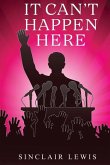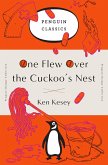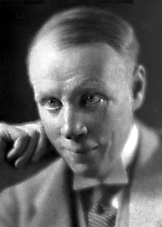1935, die USA stecken mitten in der Depression, die wirtschaftliche Lage scheint sich nach dem Börsencrash von 1929 nicht mehr erholen zu können. Dies bestimmt auch maßgeblich den Wahlkampf um das Präsidentenamt. Der charismatische Berzelius Windrip kann unerwartet die Massen begeistern. Sein
15-Punkte-Plan wird enthusiastisch aufgenommen, vor allem von denjenigen, die am schwersten unter der…mehr1935, die USA stecken mitten in der Depression, die wirtschaftliche Lage scheint sich nach dem Börsencrash von 1929 nicht mehr erholen zu können. Dies bestimmt auch maßgeblich den Wahlkampf um das Präsidentenamt. Der charismatische Berzelius Windrip kann unerwartet die Massen begeistern. Sein 15-Punkte-Plan wird enthusiastisch aufgenommen, vor allem von denjenigen, die am schwersten unter der Krise zu leiden haben. Dass das Programm sich gegen Frauen, Schwarze und auch Juden richtet, fällt dabei nicht ins Gewicht. Doremus Jessup, angesehener Verleger des „Informer“, und seine Familie nehmen den Spuk nicht ernst, aber schon bald nach der Wahl und dem Sieg Windrips ändern sich die Zeiten und ein neuer Staat entsteht aus dem freiheitsliebenden Amerika: aus Gewaltenteilung wird zentrierte Macht, aus Freiheit des einzelnen wird Kollektivierung und die Gleichschaltung setzt alsbald auf allen Gebieten des Alltags ein. Und wer nicht mitmacht, bekommt die neue Härte des Staates zu spüren.
Sinclair Lewis‘ Roman „It Can’t Happen Here“ passend zur aktuellen Lage von Penguin neu aufgelegt liest sich im Jahr 2017 wie ein unglaublich prophetisches Werk und lässt einem zwischen ungläubigem Staunen und schierem Entsetzen zurück. Zunächst beginnt der Roman etwas langatmig mit ausufernden Beschreibungen und Details, die 80 Jahre nach der Entstehung eher mühsam als unterhaltsam sind. Aber nach dem ersten Viertel steigert sich Lewis enorm und gerade die zweite Hälfte entwickelt eine unglaubliche Kraft. Man muss sich zunächst etwas mühen, aber es lohnt sich, hier am Ball zu bleiben.
Das Jahr des Handlungsbeginns ist das Entstehungsjahr des Romans und dieser war sicherlich durch die aktuellen politischen Ereignisse beeinflusst. Was man dann jedoch liest, ist eine musterhafte Anleitung an Despoten, wie sie ein Volk überrennen und sich Untertan machen können. Vieles ist aus heutiger Sicht völlig klar, wir haben es aus den Geschichtsbüchern kennengelernt – Sinclair Lewis aber zeichnete vorweg, was in Deutschland in den 30er Jahren unter Hitler und den Nazis erst noch geschehen musste. Immer wieder muss man sich vor Augen halten, dass der Autor all dies nicht kannte, inwieweit er überhaupt über die Ereignisse in Europa en détail informiert war, ist ebenfalls zu hinterfragen. Sein dystopischer Roman indes lässt nichts aus, was wir nicht hier gesehen hätten: Konzentrationslager, willkürliche Verhaftungen und Erschießungen aller Andersdenkenden, Bücherverbrennungen, Ausschalten der Presse – you name it. Ein einziger starker Mann, der sich clever eines Teams von einsatzstarken Männern (hier: MM – does it ring a bell?) bedient, um sein Vorhaben zu realisieren.
Neben dieser historischen Lesweise bleibt unweigerlich der Blick auf die Gegenwart. Wer wollte schon ernsthaft in Betracht ziehen, dass Donald Trump zum Präsidenten gewählt wird? Wer kann sich vorstellen, dass die Türkei in einer freien Wahl eine diktatorische Ein-Mann-Staatsform bevorzugt? „It Can’t Happen Here“ – weit gefehlt. Man fühlt sich erschreckend erinnert an die Tageszeitung mit all den unglaublichen Berichten aus unterschiedlichen Ecken der Welt. Wie kann ein 80 Jahre alter Roman so passgenau die Tagespolitik wiedergeben?
All diese inhaltlich bemerkenswerten Aspekte finden sich auch wieder in Lewis‘ pointierter, mal ironisch, mal sogar sarkastischen Schreibweise. Eine kurze Rezension erlaubt es leider nicht, die wirklich treffenden Formulierungen angemessen zu würdigen, mit denen er den Handlungsverlauf darbietet. Auch kann man die Diskussion, warum dieser Roman hinter werken wie „Brave New World“ und „1984“, die zeitnah entstanden sind, so zurücksteht, nur anreißen. Seine politische Aussagekraft hat Sprengwirkung und macht ihn für mich zu einem zwingenden Werk für junge Generationen.









